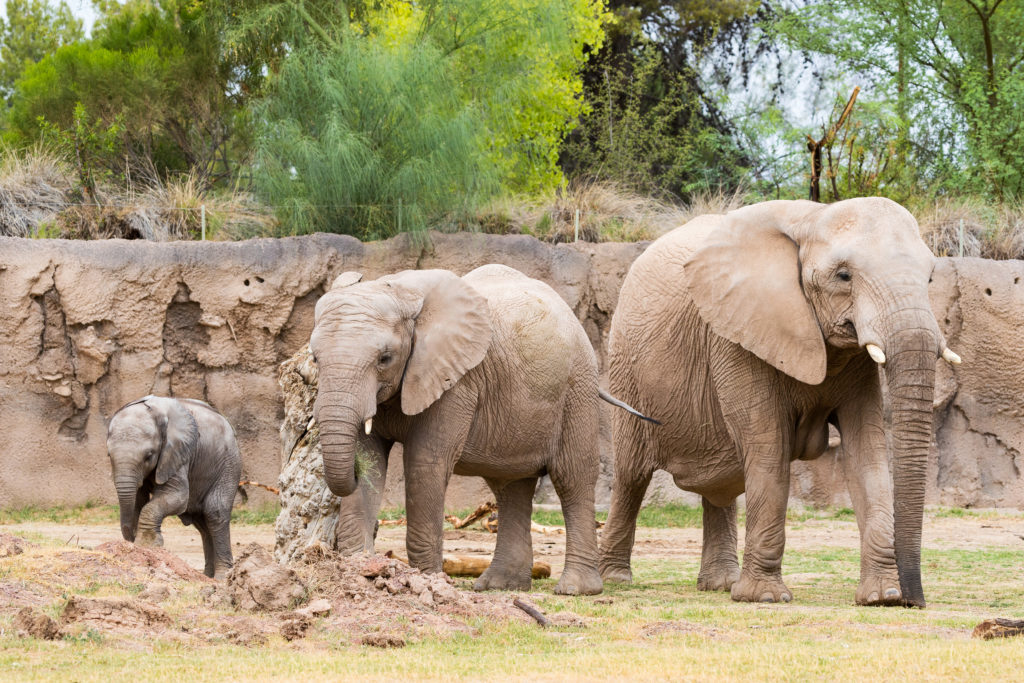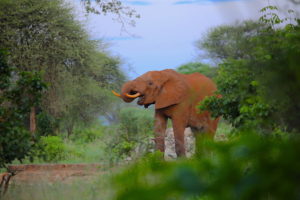Reid Park Zoo is Committed to the Conservation of Endangered Elephants

African Elephants Are Now Listed as Endangered
In late March African savanna elephants were reclassified as Endangered by the IUCN red list. Previously listed as Vulnerable, new research shows that African savanna elephant populations have decreased by at least 60% over the last 50 years to the point of reclassification. Their close cousins, the African forest elephants, have been reclassified as Critically Endangered after their numbers have decreased by 86% over the last 31 years. Decades of continued pressure from habitat loss, poaching, climate change, and human conflict have led to this decline in population.
Reid Park Zoo is deeply dedicated to the conservation of elephants. As members of the African elephant Species Survival Plan, our herd of African savanna elephants are critical ambassadors for their wild cousins. Zoos work to protect elephants in the wild and serve as genetic reservoirs to maintain a high genetic diversity within the species through professionally-developed breeding programs. Every elephant birth is now more important than ever, and we are so grateful to have had two calves born at Reid Park Zoo. The elephants at your Zoo inspire guests to learn about them by providing the opportunity for Zoo staff and volunteers to teach guests about elephants and how we can protect them.
 By visiting Reid Park Zoo you are directly helping to protect wild elephants. As proud supporters of the Tanzania Conservation and Science Program Reid Park Zoo helps support research and community work in elephants’ home ranges. To date, this conservation program has protected over 1 million acres of elephant habitat while providing valuable research about elephants. You can also protect elephants by being an informed consumer. Poaching for ivory is a key threat to elephants. The United States is the second largest importer of illegal wildlife and wildlife products in the world, so be aware of the origin of products you are purchasing and never purchase ivory. Reducing the amount of carbon your daily activities emit, which contributes to climate change, is another step you can take to protect elephants. Changes in climates around the world due to global warming have affected rainfall in many locations. Without reliable rainfall, elephants are not able to find the food they need to survive. Lastly, taking a stand to support wild animals and wild places when you vote is also crucial. Voting for local and national policies that combat the illegal wildlife trade and climate change protects wildlife around the world.
By visiting Reid Park Zoo you are directly helping to protect wild elephants. As proud supporters of the Tanzania Conservation and Science Program Reid Park Zoo helps support research and community work in elephants’ home ranges. To date, this conservation program has protected over 1 million acres of elephant habitat while providing valuable research about elephants. You can also protect elephants by being an informed consumer. Poaching for ivory is a key threat to elephants. The United States is the second largest importer of illegal wildlife and wildlife products in the world, so be aware of the origin of products you are purchasing and never purchase ivory. Reducing the amount of carbon your daily activities emit, which contributes to climate change, is another step you can take to protect elephants. Changes in climates around the world due to global warming have affected rainfall in many locations. Without reliable rainfall, elephants are not able to find the food they need to survive. Lastly, taking a stand to support wild animals and wild places when you vote is also crucial. Voting for local and national policies that combat the illegal wildlife trade and climate change protects wildlife around the world.
We are proud to be a home for endangered African elephants. When you meet Mabu, Semba, Lungile, Nandi, and Penzi we hope that you are inspired to learn more about elephants and support changes that protect them. We invite you to join accredited zoos around the country in the fight against the illegal wildlife trade. You can learn more at https://wildlifetraffickingalliance.org/.
Together we can save elephants!
